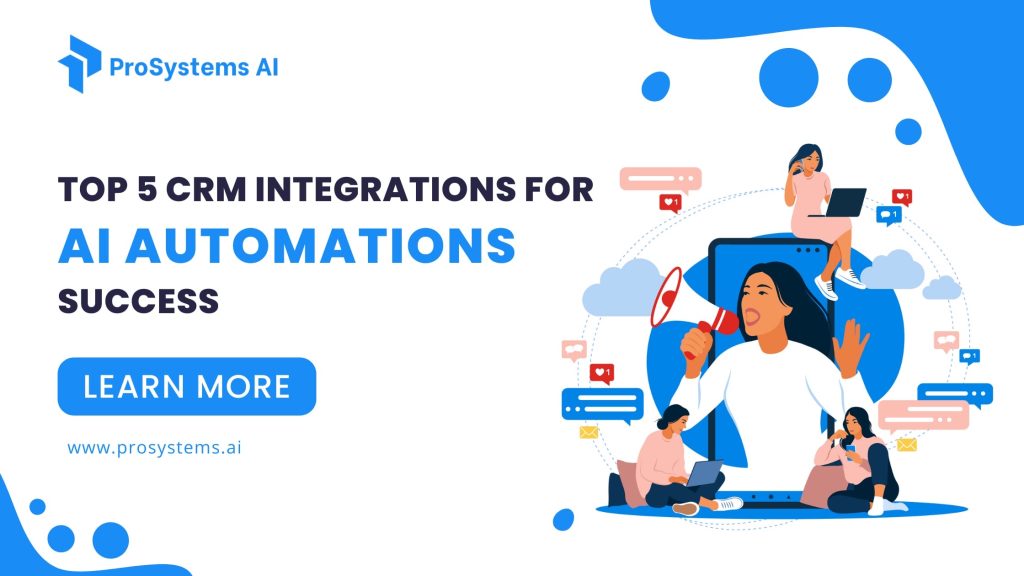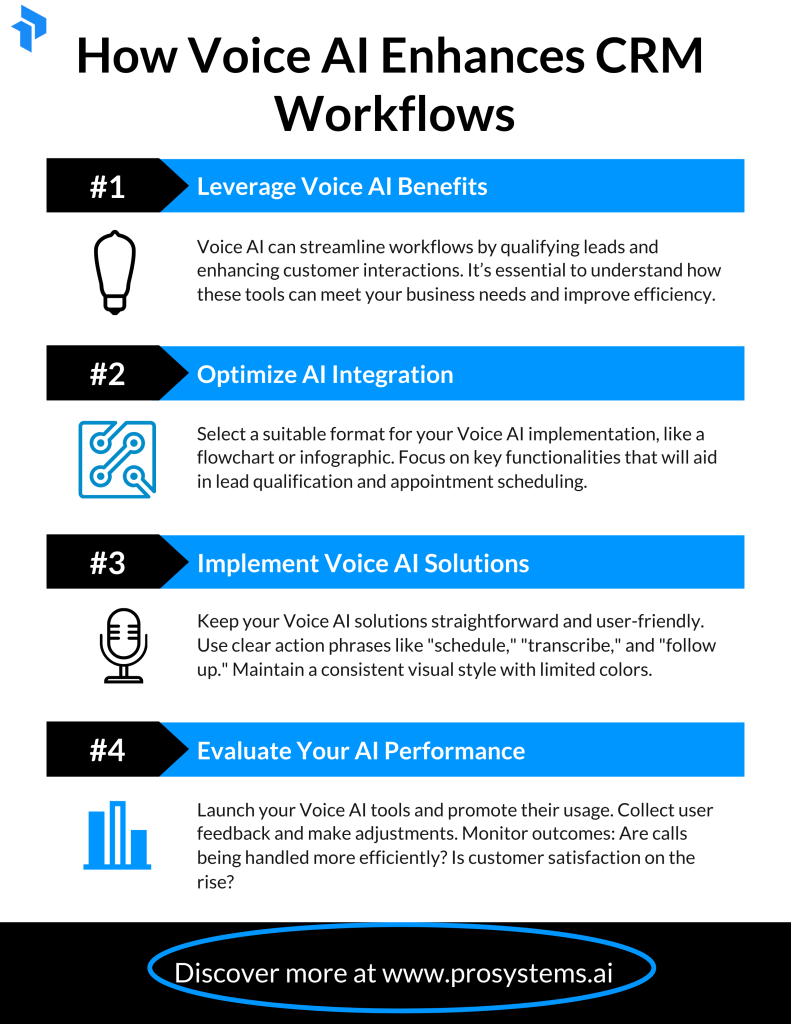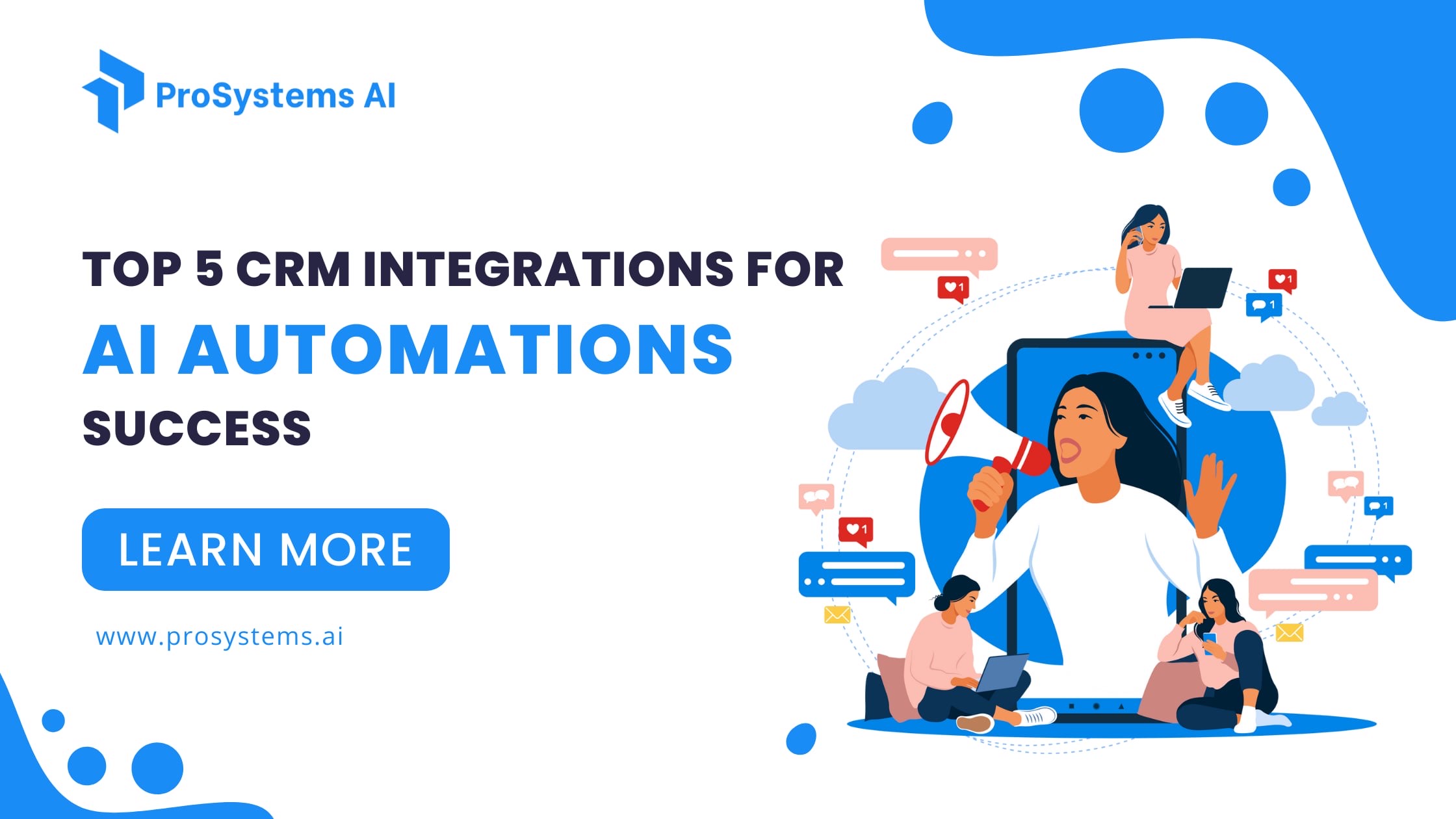
Does your CRM do more than just store information?
In today’s business environment, the answer needs to be yes. As customer expectations evolve and businesses aim to scale smarter, integrating Artificial Intelligence (AI) with your CRM becomes crucial—not just for efficiency, but for relevance.
CRM systems were originally designed to help businesses manage contacts, deals, and communication. But with the rise of AI technologies—like natural language processing, machine learning, and predictive analytics—companies can now automate those workflows, understand customer behavior, and even initiate conversations intelligently.
According to IBM, AI enables machines to learn from experience, adjust to new inputs, and perform human-like tasks such as identifying patterns, analyzing text, or even holding a conversation. This is the missing layer in many CRMs—and adding it can make the difference between simply managing customers and truly engaging them.
In this guide, we’ll explore:
- Why AI-enhanced CRM is a game-changer
- The top 5 CRM platforms best suited for AI automation
- Real-world examples of CRM + AI success
- How platforms like Prosystems.ai fit into this evolving ecosystem with voice and text automation
- A side-by-side comparison to help you choose the best solution
Why AI + CRM Is the New Standard?
Traditionally, CRMs helped businesses store information and track communication. But modern business needs demand more than data storage—they require insights, speed, and automation.
Here’s what AI adds to CRM:
- Predictive lead scoring: AI identifies which prospects are most likely to convert
- Real-time task automation: Emails, follow-ups, and reminders are triggered by customer actions
- Behavior analysis: AI detects buying intent, sentiment, or urgency in customer messages
- Multichannel support: From live chat to AI voice agents, AI enables 24/7 communication without increasing headcount
As covered in Wikipedia’s overview of Customer Relationship Management, CRMs have come a long way from their contact-list origins, evolving into full-blown intelligence platforms when AI enters the equation.
1. HubSpot + AI Tools
Best for: Startups and SMBs focused on growth and simplicity
HubSpot is one of the most accessible CRM platforms, offering a clean interface, powerful free tools, and a growing list of AI features. With its robust marketing automation, HubSpot is ideal for companies ready to use data more intelligently.
AI Highlights:
- Predictive lead scoring
- Smart content generation (via OpenAI integrations)
- Automated chatbot and conversation flows
- Email send-time optimization
Through its App Marketplace, HubSpot also supports third-party AI tools for transcription, sentiment analysis, and voice bot integration. For example, a company using Prosystems.ai can route inbound sales calls through an AI voice agent that logs notes directly into HubSpot, reducing manual input and increasing response speed.
2. Salesforce + Einstein AI
Best for: Enterprises and large teams needing deep AI and CRM customization
Salesforce is widely recognized for its enterprise CRM capabilities, and its native Einstein AI takes automation and forecasting to the next level.
What Einstein Offers:
- Opportunity and pipeline predictions
- NLP-based case classification
- Smart task recommendations for sales teams
- Email and call data auto-logging
Salesforce’s Einstein, Einstein integrates directly into all Salesforce clouds, making it a powerful tool for both marketing and support teams.
When voice AI agents are layered on top—such as those from Prosystems.ai—calls can be handled, qualified, and recorded without the need for agent intervention. All relevant insights can be pushed into Salesforce, creating a unified system of record.
3. Zoho CRM + Zia AI
Best for: Cost-conscious businesses that need built-in intelligence
Zoho CRM is an increasingly popular platform among small and mid-sized businesses. Its built-in AI assistant, Zia, offers a helpful layer of automation and insight without third-party costs.
Key Zia Features:
- Lead scoring and forecasting
- Workflow suggestions based on CRM behavior
- Email sentiment analysis
- Anomaly detection in sales pipelines
Zia also includes a conversational interface, allowing users to ask performance-related questions like “Which deals are at risk?” or “What was our Q1 conversion rate?”
Integrating voice AI systems enables these interactions to go beyond the screen. Using platforms like Prosystems.ai, businesses can collect voice input from phone calls and use Zia’s machine learning models to interpret and act on that data in real time.
4. Pipedrive + Smart AI Integrations
Best for: Sales-focused teams seeking agility
Pipedrive is purpose-built for pipeline management and sales enablement. While it lacks a native AI engine, its open architecture and plugin system allow for seamless integration with AI tools.
AI Enhancements via Add-ons:
- Smart email tracking and reply suggestions
- Deal-stage workflow automation
- AI-enhanced scheduling
- Custom chatbot connections
Pipedrive works well for teams that want clear visual pipelines and minimal clutter. For example, when connected with a voice AI platform, you can automate callbacks, lead qualification, or even appointment booking directly from the call interaction—everything syncing with your CRM dashboard automatically.
5. Freshsales (Freshworks) + Freddy AI
Best for: SaaS and customer support-driven companies
Freshsales, part of the Freshworks suite, includes Freddy AI, which helps sales and support teams take action faster.
Freddy AI Functions:
- Predicts win probability for deals
- Scores leads and ranks them based on behavior
- Flags inactive contacts or lost opportunities
- Suggests the best time to engage with customers
For businesses running high-volume operations, Freddy enables real-time insights that help prioritize tasks and increase closing rates. Combined with voice AI agents, Freshsales can become an always-on lead processor, reducing missed opportunities and improving team productivity.
CRM + AI Comparison Table
| Feature | HubSpot | Salesforce | Zoho CRM | Pipedrive | Freshsales |
|---|---|---|---|---|---|
| Native AI Engine | Yes | Yes (Einstein) | Yes (Zia) | No (via add-ons) | Yes (Freddy) |
| Predictive Lead Scoring | Yes | Yes | Yes | Yes | Yes |
| Voice AI Integration Possible | Yes | Yes | Yes | Yes | Yes |
| Ideal Business Type | SMB | Enterprise | SMB to Mid-size | Sales-driven | SaaS/Support |
| Pricing | Free–Premium | Enterprise-level | Affordable tiers | Moderate | Subscription-based |
How Voice AI Enhances CRM Workflows

AI chatbots are common, but voice AI is quickly gaining traction—especially for businesses with high call volumes, time-sensitive sales, or appointment-heavy models.
Voice AI tools can:
- Answer calls and qualify leads using conversational AI
- Schedule appointments directly into calendar apps
- Transcribe and summarize calls into CRM notes
- Trigger follow-ups or task creation in real time
Prosystems.ai, for example, offers voice AI agents that plug directly into most major CRMs. These agents automate inbound and outbound calls, ask qualifying questions, and update your CRM without any manual effort—making the lead funnel faster and more accurate.
FAQs: AI-Driven CRM Systems
1. Is AI in CRM only for large enterprises?
Not anymore. Many CRM platforms like HubSpot and Zoho offer AI capabilities in their lower-tier plans or through integrations, making them accessible to startups and small teams.
2. How secure is AI data processing in CRM systems?
Most modern CRMs and AI platforms comply with international standards like GDPR, CCPA, and ISO 27001. Data encryption, access controls, and anonymization are typically built in. Prosystems.ai also adheres to strict security protocols.
3. Can AI replace human sales reps or agents?
No—but it can enhance them. AI handles routine, repetitive tasks like data entry, lead qualification, or appointment setting, freeing up your human team to focus on closing deals and building relationships.
4. What’s the ROI of combining AI with a CRM?
Businesses report time savings, reduced lead response time, and improved conversion rates. AI eliminates bottlenecks, ensures CRM accuracy, and often leads to a 20–40% increase in efficiency.
Conclusion
The future of CRM isn’t just about managing relationships—it’s about understanding and automating them. Platforms like HubSpot, Salesforce, Zoho, Pipedrive, and Freshsales all offer strong foundations for CRM. But their full potential is unlocked when AI is added to the mix.
Whether you need smarter lead scoring, faster follow-ups, or automated phone conversations, the right combination of CRM and AI can transform how your team works and how your business grows.
Platforms like Prosystems.ai add a critical voice-based layer to this system—helping you automate conversations, qualify leads, and keep your CRM clean without adding to your team’s workload.

Leave a Reply